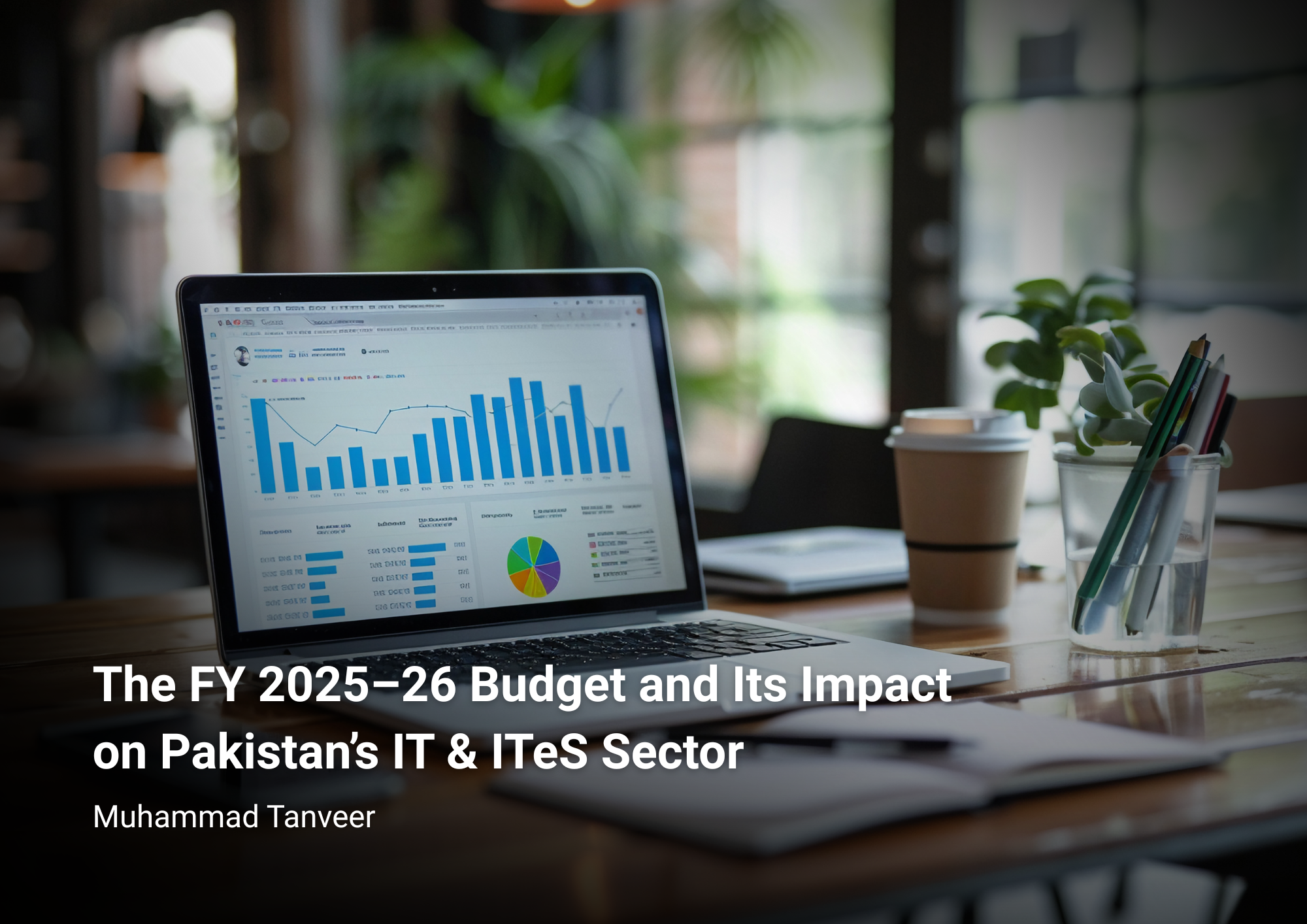NEWS

IN BRIEF

The federal budget for FY 2025–26 arrives at a defining moment for Pakistan’s digital economy. With a growing talent base and global traction, the IT and ITeS sector holds immense promise. The budget includes encouraging steps toward digital payments and infrastructure expansion but also reveals deeper structural gaps that continue to limit long-term growth.
Incentives that once fueled export momentum remain uncertain, and taxation around digital transactions and remote earnings lacks the clarity needed to anchor business confidence. Rather than abrupt exits, we’re seeing a quiet redirection of talent and capital toward ecosystems that offer clearer incentives and long-term policy stability.
Drawing from current industry shifts, this thought piece makes the case for transitioning from short-term signals to long-term strategy. Because in today’s digital economy, the real competitive edge isn’t just cost or code—it’s confidence. And confidence is built through coherence, commitment, and continuity.
SHARE
Pakistan’s IT and IT-enabled Services (ITeS) sector has long been viewed as a key engine of economic growth. With a burgeoning young workforce and an expanding global footprint, the sector has shown resilience and promise, contributing billions in export revenue.
The federal budget for FY 2025–26 arrives at a crucial time for the industry. While there are some forward-looking measures aimed at digitalization and formalization, the budget also reflects a lack of clarity, consistency, and commitment that continues to hinder the sector’s full potential.
What the Budget Got Right
1. Emphasis on Digital Financial Ecosystems
Encouraging the use of electronic invoicing, POS systems, and digital transactions is a step in the right direction. These measures can improve documentation, increase transparency, and reduce informal cash-based transactions that limit economic visibility.
2. Commitments to Infrastructure Expansion
Proposals to invest in digital infrastructure, particularly in underserved areas, hold promise for broader connectivity and inclusion–especially if implemented effectively and inclusively.
What the Budget Overlooked
1. Lack of a Stable Tax Regime
Despite repeated demands by the industry, the government has failed to provide a long-term, stable, and clear tax framework for IT exporters and remote earners. Instead, ad hoc tax changes and policy U-turns continue to create an environment of uncertainty.
2. Missed Opportunity on Export Incentives
No extension was announced for the existing tax exemptions on IT exports. This omission is particularly alarming, as many companies had made strategic investments based on the continuation of these incentives. With these gone, the business case for keeping operations in Pakistan weakens significantly.
3. Counterproductive Taxation of Digital Transactions
New taxes on digital transactions and foreign e-commerce purchases may hurt startups and smaller companies more than they help revenue collection. These levies, while possibly effective in theory, risk stifling early-stage innovation if not accompanied by relief measures for SMEs.
Alarming Trends Behind the Numbers
Over the past couple of years, Pakistan has celebrated the rise in IT-related remittances as a success story. However, behind this growth lies a troubling trend: an increasing number of individuals and companies – many of whom I personally know – have shifted their operations abroad, particularly to the UAE, drawn by more favorable tax regimes and regulatory stability.This shift has three serious consequences:
- Loss of Retained Earnings
These companies often do not bring their earnings back into Pakistan beyond basic operational expenses, which reduces the foreign exchange inflow into the domestic economy.
- Disguised Employment
Many high-earning Pakistani professionals are now employed as freelancers or contractors, paid from abroad. This deprives Pakistan’s tax system of income tax from some of the most skilled and well-paid segments of the workforce.
- Talent Drain Within Pakistan
Companies still fully based in Pakistan are struggling to attract top talent, as the heavy and often inconsistent tax burden discourages highly skilled professionals from working with locally registered firms.
The Bigger Picture: A Sector in Retreat?
The exit of several multinational tech giants from Pakistan in recent years, including Microsoft, is another significant concern. These companies cited instability and unpredictable policies as key deterrents to maintaining or expanding their operations. Their departure has not only reduced direct investment but also weakened the local ecosystem in terms of capacity building and employment opportunities.
Adding to this irony is the fact that just recently, a high-profile government-backed conference – DFDI (Digital Foreign Direct Investment) – was organized in Islamabad using public funds. Multi-million rupees were spent on hosting international delegates, signing MoUs, and showcasing Pakistan’s digital potential. However, without aligned and rational tax policies, these efforts risk being symbolic rather than substantive. If policy instability persists, many of the DFDI MoUs and promised investments may never materialize.
Consequences That Can’t Be Ignored
- Loss of Credibility Among Investors
- Brain Drain and Informality
- Missed Economic Opportunity
What Needs to Change
- Announce a Decade-Long Tax Policy for the IT Sector
Stability is more important than short-term revenue. A predictable tax regime will help build trust, attract investment, and encourage businesses to grow within Pakistan.
- Restore Export Incentives and Link Them to Performance
Exporters bringing in foreign exchange should be supported through tax relief–tied to job creation and reinvestment in Pakistan.
- Reform Taxation for Remote Workers and Freelancers
Introduce simplified and fair tax rates to incentivize professionals to register and contribute domestically, rather than staying in the informal economy.
- Ensure That Investment Drives Are Matched by Policy Reform
High-profile summits and investor conferences must be backed by actual policy alignment. Otherwise, they risk becoming hollow PR exercises.
Pakistan’s IT and ITeS sector stands at a turning point. While the country boasts world-class talent and a growing global presence, the domestic policy environment is failing to keep pace. Without consistent, fair, and forward-looking reforms, we risk losing our best people, our biggest opportunities, and our most strategic industry.
Now is the time to align intention with action and to choose sustained digital progress over short-term policy optics.
About the Author:
Muhammad Tanveer is a board member of the Accountability Lab Pakistan and the CEO of the AppDesk.
